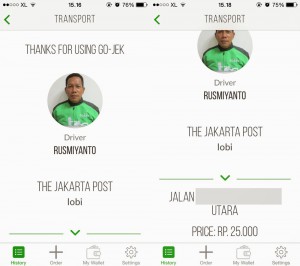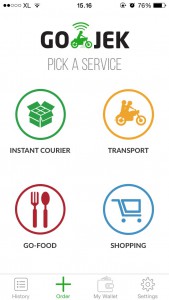Ojek – the fastest mode of transport against traffic gridlock Posted by asimonoff on Jan 31, 2016 in Uncategorized
When you are in Indonesia, you will often hear people saying “Macet total. Naik ojek aja.” Which is translated “Well, it is a total traffic gridlock. It would be better to take an ojek” , “tidak ada kendaraan umum ke (daerah) itu. Naik ojek aja.” (as the area cannot be reached by public transit; it would be best to take an ojek). What is an ojek?. The word “ojek” is derived from the word “obyek”, a short form of “mengobyek”, which means “side job”. It is a motorcycle taxi that recently has become the most reliable mean of transportation both in the rural area that lack of transport and infrastructure or in a dense of traffic congestion like in Jakarta, where the traffic jams continue throughout the day. In Jakarta, people`s everyday life are planned around the traffic congestion. Travelling, even short distances can take hours and some parts of the city is in a constant state jam.
image by Charles Wiriawan/Flickr/all creative commons
There is no solution for the traffic jam in Jakarta or Bandung, a nearby city. The ojek, either the motorbike or the bike taxi, is considered a solution, because of its maneuverability, as well as the ojek driver, who is knowledgeable about shortcuts (jalan tikus, jalan pintas) that you never knew existed.
image source: http://tolegaler.blogspot.com/2012/01/jalan-tikus-unila-d.html
The traditional ojek can be found at “pangkalan ojek”, the ojek waiting spot”, or wait on the side of the road to catch one. Ojek is usually quite scarce during lunchtime or the rush hour (jam sibuk). Aside from that, there are disadvantages of using traditional ojek services, such as sharing of the helmet, body odors of the drivers, and price negotiation that is sometimes quite tiring, especially when you are in a hurry to get to a destination.
image by Caroline Mitchell/Flickr/all creative commons
Thanks to the smartphone technology and business savvy of the first ojek operator, Go-Jek, who introduced the use a ride-hailing app, the popularity of technology-based ojek services has been rapidly rising. It is a ride-hailing app; reserving an ojek is now at your fingertip. You can use their services for taking you places, package delivery, foods delivery (breakfast, lunch, dinner), and even buying a movie ticket for you. The advantages of the ride-haling app are a fixed price for each kilometer traveled, fees, and clean helmet for the passengers.
image by Dewi Angraeny/Flickr/all crative commons
There are a lot of ojek operators who have joined the bandwagon, ranging from those who specialize in serving Muslim women and female customers who are more comfortable with female drivers to types of services provided to the customers. Each operator drivers can be easily spotted on the road by the color of uniforms they are wearing, such as green, yellow, or pink.
The technology-based ojek operators have also opened a new job opportunity to those who need extra income or who do not have qualifications to work in the formal sectors.
image by Falasik/Flickr/all creative commons
If you are planning to stay or visit Jakarta, here are several names of ojek operators: Go-jek, Grabbike, BlueJek, GetJek, Ladyjek, Ojek Syar’i, and Limobike.
Selamat mengojek ‘Happy ojek-riding’!

Build vocabulary, practice pronunciation, and more with Transparent Language Online. Available anytime, anywhere, on any device.
About the Author: asimonoff
I’m an Indonesian language instructor, instructional material developer, reading test developer, and interpreter. I have been teaching Indonesian to adult students for 15 years, and have been teaching students from many backgrounds, such as private, military and diplomatic service employees. I’m Indonesian, but am living in the US now; my exposure to different cultures in my home country and in the US has enriched my knowledge in teaching Indonesian as a second language. I approach the teaching of the Indonesian language by developing students’ critical cultural awareness and competence. This method of teaching has been proven to be a key to the success of my students. Students become conscious of the essential role culture plays in the language.









